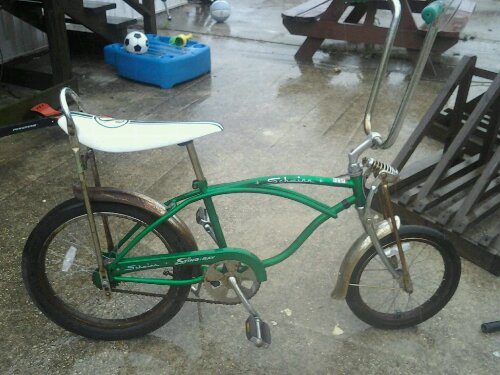For a while now, in my pursuit of living more deliberately, I’ve considered starting to ride my bike to work. I love driving my car, don’t get me wrong. There’s a part of me that wants to do it just because I can. However, after considering the costs involved in driving to work every day, I’ve come to realize that it would actually save me money in the long run… and not just gradually. Since moving back to my hometown, I mostly use my car to get back and forth to work now. Every now and then I’ll use it to go to the store, but that’s uaually on my way home from work. My commute now is 8.5 miles by car, each way. That comes to 85+ miles a week, and my car uses 93 octane (it’s supercharged) so it costs me about $10.50 a week in gas. That’s around $45 a month in gas, not to mention the reduced wear and tear on my car, which doesn’t exactly use the cheapest tires, oil, or parts.
The decision to bike commute isn’t strictly financial, though. I love riding a bike, and I already ride about 14 miles in the morning before I drive to work, anyway. I figure I’ll just skip the driving part, and still get a nice bike ride in every morning. I will likely still want to drive the car occasionally, and I’m okay with that. However, this way I don’t have to drive, and if I have to do any major work on the car, I don’t have to worry about having it done by Monday morning.
So what do I need to do to start commuting to work? Well, if you know anything about me, you’ll know I researched it extensively beforehand. I scrounged through every forum and blog I could find for bicycle commuters, and came up with some very interesting tidbits of information. With places like BikeForums.net there was plenty of experience and advice to learn, which I soaked up. Here’s some of the most important things I learned so far, pre-commute:
1. Any bike will do
I looked at my tired Schwinn/Pacific mountain bike. It is the perfect commuter bike in that it has all the mounts for fenders and racks, has wide gearing, is comfortable, cheap, and fairly reliable. It doesn’t take a lot of money to get a decent commuter bike if you’re not picky. As long as you can ride it comfortably far enough, and it can hold everything you need to bring, then it’s a good bike. You will want to upgrade it at some point, but it’s not required to start with.
2. Be Prepared
You have to know what you’re getting yourself into. You need to practice the route on a non-work day, to figure out the best route to take. You need to assemble what you need, so you can find out how to carry everything. Make sure you have a way to clean up at work, and a place to store your bike. Make sure the bike is tuned up, you have what’s needed to fix a flat tire, basic tools, etc. If the weather looks bad, make sure you have appropriate raingear, or at least a towel to dry off when you get there. If you ride in the early or late hours, invest in a good lighting system (doesn’t have to be expensive).
3. Don’t Worry About Being Too Prepared
No matter what happens, it’s not the end of the world. There’s very little chance you’re going to lose your job over a simple mistake, or an accident. People are generally forgiving, and you can learn from your mistakes. If you work at a job where simple mistakes are not tolerated, I’d highly recommend rethinking your career choices anyway.
I’m looking forward to commuting, and as I go, I will document the lessons learned, and maybe give some encouragement along the way.

